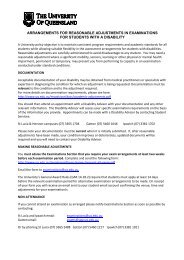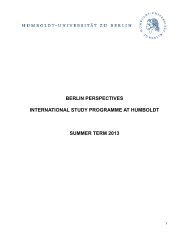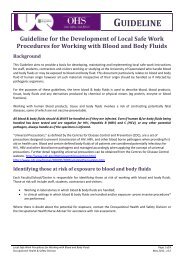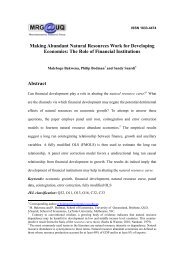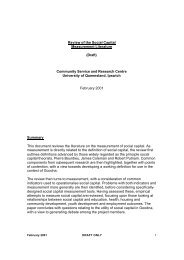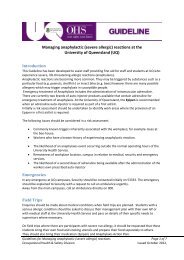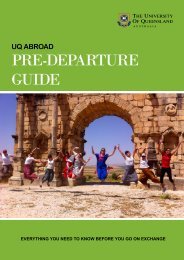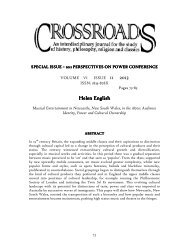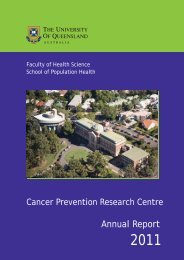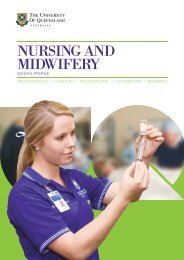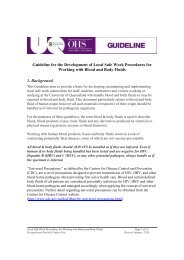Winter 2013 - University of Queensland
Winter 2013 - University of Queensland
Winter 2013 - University of Queensland
You also want an ePaper? Increase the reach of your titles
YUMPU automatically turns print PDFs into web optimized ePapers that Google loves.
Dr Jean Calder ACDiploma in Physical Education – ’58Certificate in Education – ’63Certificate in Teaching and TrainingSub-Normal Children – ’67Bachelor <strong>of</strong> Arts – ’68alumni pr<strong>of</strong>ileSHumanity ON The front lineSurrounded by the aftermath <strong>of</strong> civilwar, Dr Jean Calder AC shirks politics.Despite this, she has been chased,shot at, bombed and banished acrossborders in her tireless bid for social justice.Her adopted home on the Gaza Stripbears the scars <strong>of</strong> intergenerational fighting.Unemployment is high and more than half <strong>of</strong>the population live below the poverty line.At age 76, and having spent 30 yearsin the Middle East, the 2012 Alumnus <strong>of</strong>the Year (awarded by Alumni Friends <strong>of</strong>The <strong>University</strong> <strong>of</strong> <strong>Queensland</strong> Inc.) is stilla woman <strong>of</strong> action, working tirelessly forpeople with disabilities, who are <strong>of</strong>ten on thevery lowest rungs <strong>of</strong> the economic ladder.Her efforts won her Australia’s highest civilhonour in 2005 – Companion <strong>of</strong> the Order <strong>of</strong>Australia – for her inspirational humanitarianservice, leadership and commitment tointernational relations, and academic andpr<strong>of</strong>essional training in rehabilitation.The refugee camps <strong>of</strong> Lebanon and Gaza,and the poorest suburbs <strong>of</strong> Cairo, are a farcry from Calder’s home town in Mackay,north <strong>Queensland</strong>, and from the peacefulhalls <strong>of</strong> UQ, where she studied physical andspecial education in the 1950s and 60s. ANicklon-Macgregor and Fulbright Scholarshipfollowed, taking her to the <strong>University</strong> <strong>of</strong>Connecticut, where she completed a Mastersdegree in Physical Education for the Disabled.This led to a government fellowship to obtaina PhD in Recreation for Special Populationsfrom Pennsylvania State <strong>University</strong> in 1979.“I always had a great interest in peopleand the international community,” she said.“As I grew older, I grew moreconcerned about its inequalities. I had theoverwhelming feeling that I needed todo something important in my life, andto share my opportunities, but I had noidea I would end up in Palestine. Beinga grassroots person, things just seem tohappen to me.”After watching a documentary about thePalestinian crisis in the 1970s, Calder wastouched by the scene <strong>of</strong> an orphaned babywith cerebral palsy in a temporary hospitalunder siege. This led to her eventuallybecoming a volunteer with the PalestinianRed Crescent Society (PRCS) and a member<strong>of</strong> the International Federation <strong>of</strong> Red Crossand Red Crescent Societies (IFRC).“My task has always beenon the ground with thepeople, and there is still agreat deal to do here.”Later, as fate would have it, she foundand “adopted” the baby with cerebralpalsy, Hamoudi, who became an importantanchor in her life, along with two otherchildren, son Badr and daughter Dalal, nowboth in their thirties.Found as a four-year-old among therubble <strong>of</strong> a bombing raid on a PalestinianCamp in southern Lebanon, Dalal, whois blind, recently completed her Mastersdegree in Social Anthropology at Edinburgh<strong>University</strong>. She is now looking for a sponsorto further her studies in social inclusion, aconcept that gets much time and attentionin the Calder household.“Inclusion – what it means and how togo about it – is a challenge internationally,”Calder said.“People have a lot <strong>of</strong> trouble dealingwith differences, so we need to build on abroader dimension <strong>of</strong> similarity and not keepputting others in a box.”In early 1981, Beirut was a mess. Afterexperiencing war and massacre, andhaving been held at gunpoint, imprisonedand finally expelled from Lebanon in 1983,Calder went to Cairo to continue her workwith the PRCS, where she was later joinedby the three children. The PRCS moved thefamily to Gaza in late 1995. In 2007, Calderpublished an autobiographical account<strong>of</strong> their perilous adventures under the titleWhere the Road Leads.Now based in Khan Younis, in the south<strong>of</strong> the Gaza Strip, Calder continues to actas a consultant to the ever-developing work<strong>of</strong> the rehabilitation centre she establishedwithin the PRCS. Five hundred children andyoung adults with different disabilities receiveregular services, some <strong>of</strong> which extend toother towns and villages in the Gaza Strip.PRCS also has centres throughout theWest Bank, which were being followed byCalder in her consultant role. For several years,however, she has been unable to visit thesecentres because, like many Palestinians, sheis not permitted to cross into the West Bank.In addition to her work with PRCS,Calder has been involved in giving lecturesand presenting conference papers at localuniversities, and to organisations andinternational groups. She has also beeninstrumental in setting up a four-year accreditedbaccalaureate degree in Special Educationand Rehabilitation, based on the pr<strong>of</strong>essionalprogram she developed to train rehabilitationworkers at the PRCS centre in Cairo.“We teach everyone that disabilityis behind the child, not in front, whichis particularly encouraging for parentswho have struggled on with little hope orsupport,” she said. “Palestinians are <strong>of</strong>tenmisrepresented, but my task has alwaysbeen on the ground with the people, andthere is still a great deal to do here.”UQ Contact WINTer <strong>2013</strong> 35


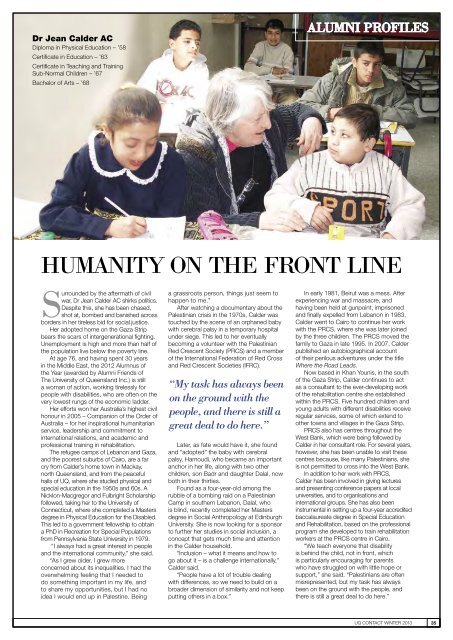
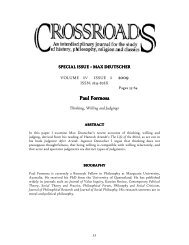
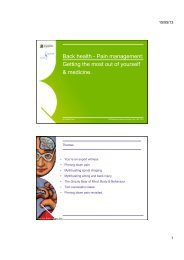
![Recycling [ PDF, 62KB ] - University of Queensland](https://img.yumpu.com/51805185/1/184x260/recycling-pdf-62kb-university-of-queensland.jpg?quality=85)
